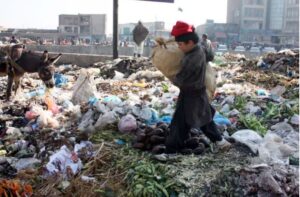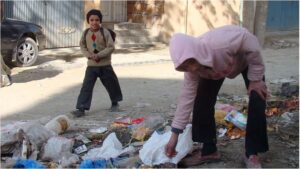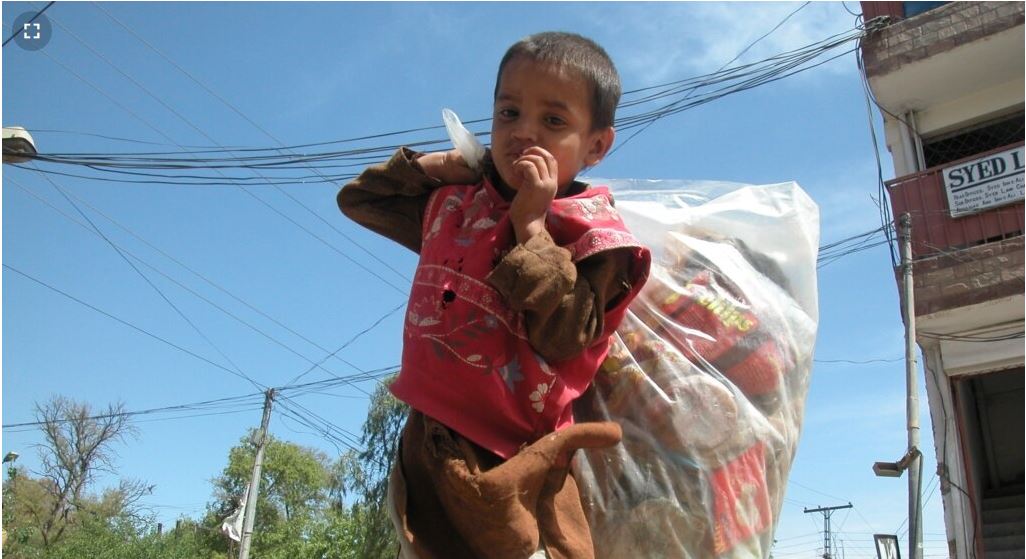On the crowded streets of Kabul’s Chahar Asiab District, where children should be carefree and full of dreams, many are instead trapped in the harsh realities of survival. Forced into dangerous labor, they sift through trash, working tirelessly to support their families.
In a country beset by economic collapse and political instability, their plight is a heartbreaking testament to a system that has failed its most vulnerable, leaving these children to endure an unforgiving world on their own.
According to the United Nations Office for the Coordination of Humanitarian Affairs, 19% of children in Afghanistan are involved in child labor.
Jamshid, a 13-year-old boy from the Char Asiab district, is one of the many young faces of Kabul’s child labor crisis. His days are not spent in classrooms or playgrounds but in the city’s streets and trash heaps, collecting plastic bottles and other sellable items. Dressed in tattered clothes and worn-out sandals, Jamshid quietly goes about his day, his small hands rummaging through garbage bins to find anything that might help him earn a little money for his family.
“There are 12 of us at home—four sisters, four brothers, my grandmother, grandfather, and my parents. My father is disabled, and I collect bottles to support my family,” Jamshid told my colleague, Abdullah, who met the boy while he was working.
Jamshid’s story is both heartbreaking and emblematic of the struggles many Afghan children face. His father’s disability has left the family without a primary breadwinner, forcing Jamshid to shoulder the burden at an age when most children are still learning to read and write. For him, life is an endless cycle of walking through Kabul’s streets, searching for discarded plastic bottles he can sell.
When asked about school, Jamshid’s voice grew heavy with emotion. “I used to go to school, but now I can’t because I have to work and bring food home. But I go to night school.” His desire to learn is unmistakable. On days when he doesn’t have work, he helps his friends with their studies. “When I am home, my friends come to my house, and I teach them. Their parents are very kind and help us. Some of my friends are younger than me, and they say, ‘We don’t have a teacher, but we have you.’”
Jamshid dreams of becoming a teacher someday. But the obstacles standing in his way are immense. He loves drawing and playing cricket, but as he himself says, “These things are not easy for me.” The harsh reality of survival takes precedence over any childhood dreams.
A Growing Crisis
Jamshid’s story is not unique. In Kabul, countless children like him are being forced into the labor force, often working in dangerous conditions. Many have no family guardians, while others, like Jamshid, have large families dependent on their income. These children collect plastic and other trash to sell in a desperate attempt to cover their families’ basic needs.

Social experts in Afghanistan have repeatedly raised alarms over this growing issue. Ahmad Habib Hasrat, a social affairs expert, points to the underlying causes of child labor. “Children are vulnerable in Afghan society, and the authorities must pay serious attention to them. Children should not be deprived of their rights to life, education, security, protection, freedom of expression, and play. All children should have access to these rights.”
Hasrat adds that poverty, unemployment, and a lack of government support are the primary drivers of child labor in Afghanistan. “In societies with poverty and social and economic issues, children’s rights are violated. The main causes are economic problems, domestic violence, wars, armed conflicts, and exploitation,” he says. Families are often forced to send their children to work due to financial pressures.
The psychological toll on these children is immense. Marsal Mousavi, a psychologist, notes that children working on the streets face daily mistreatment and violence, which leaves lasting emotional scars. “Mistreatment and violence against these children create a sense of inferiority and resentment in them, which can lead to depression in the future. Children involved in hard labor, begging, or collecting trash on the streets are vulnerable to falling into the hands of mafia groups, which poses great danger to their future.”
Physically, the risks are equally severe. Dr. Abdullah Sahar, a pediatrician, warns that children collecting trash are susceptible to various infectious diseases. “Many children working on the streets or collecting plastic from the trash are at risk of infectious diseases such as anthrax, tetanus, black plague, and skin allergies. They are also prone to respiratory illnesses.”
The Taliban’s interim government, which took control of Afghanistan in 2021, has attempted to address the issue of child labor, but their efforts have been no enough. Samiullah Ebrahimi, a spokesperson for the Ministry of Labor and Social Affairs, says that it is the ministry’s responsibility to protect orphaned children. “The Ministry of Labor and Social Affairs considers it its responsibility to address the problems of orphaned children. For this purpose, orphanages have been established where children are provided with shelter, and their education and health are also taken care of.”
Ebrahimi also mentioned that the ministry has formed a committee to collect child beggars from the streets, but he did not provide specific figures on how many children have been helped by this initiative. Meanwhile, international organizations estimate that as many as 3.7 million children are currently engaged in child labor across Afghanistan.
According to Save the Children, over a third (38.4%) of children surveyed in Afghanistan have been forced into labor to support their families, as poverty and hunger have surged in the two years since the Taliban took power.
A Bleak Future?
The future for children like Jamshid remains uncertain. As long as economic hardship continues to grip Afghanistan, and without stronger protections for children’s rights, the cycle of poverty and child labor is unlikely to be broken.

For Jamshid, the daily grind of collecting plastic is both a burden and a necessity. Yet, despite the hardships he endures, he remains hopeful. “I love studying, and I want to become a teacher one day,” he says with quiet determination.
His words serve as a poignant reminder of the dreams and potential that lie within every child, even those working in the streets of Kabul.
Views: 36












